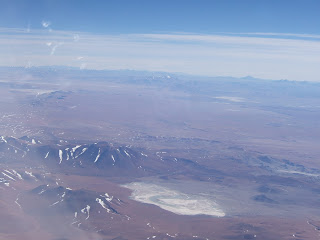Not having taken any such, I wrote a poem once called "Aerial Photograph." Years ago, but I still like the poem. Here it is, with several aerial photographs of a quite different landscape: the Andes at the border between Argentina and Chile, taken on a flight from Buenos Aires to Guayaquil. I was irritated when the pilot came over the loudspeaker to announce the border, waking me up (I had been up all night). And then I was fascinated by the dry, wrinkled, not-quite-snow-covered mountains, the suggestion of roads, the possibility of habitation, but maybe not. What do the poem and the photos have to do with each other? Not much, maybe, beyond a preoccupation with landscape, and how it belongs to us, or doesn't. Or a fascination with naming, with the ways we try to fit words to the world around us, adjusting pronunciation, spelling, understanding, until we achieve some kind of congruence.
Aerial Photograph
Skin scratched red by thistles
the old orchard brush now
interpolated from an aerial map: trees spaced so
must have been set on purpose.
The way a home site is suddenly
four survey markers and a view,
these trees bear no more fruit than elderberries
road-dusted and dripping off the stems
impossible to harvest. Ranks of purple cones
spread half a mile beyond the feeder,
that seed hung out for finches
and the orchard sinking further
into the hillside.
Trailers and small sheds
are easily distinguished, even in the grain
of prints distilled for public use.
It's easy to count incursions, stumps
that shouldn't have been cut.
Ella's place, Bauker Hill--
old boundary names that took,
the lilac hedge patched Forest,
a flowering almond in the old front yard
really one blossomed twig against the pale shrub.
Here lives the uncle from Stober,
my grandmother says,
syntax so openly transposed
I want not to notice, or want to boast
the proof my high school German offers--
this is where her accent lies,
not in the vowels but in the prepositions.
Or the fences. Dark indentations
where water gathers, wire
crossing otherwise unbroken woods--one side
is ours, and on hands and knees we grope
under rain and through a mesh
we didn't think to find. The posts
are far too new, fast question
following immediate suspicion,
furtive occupation, a sliding of green
weather-treated steel a few feet south.
Like the map of certain states
shaped like limbs or articles of clothing
you can't see this place but from the air
or from a tree. Not the slow
hazelnuts, long past production,
but from a taller fir, or the oak
below the fence line. Like a branch
grafted to an older trunk
this place is only what we call it.




 On Sunday, we went into the mountains. I'm used to the Andes further north, but these slopes were steeper, less green, more variegated in their reds and yellows and browns. We had some snow, just enough to make us shiver and stomp, and the clouds blocked the views of Aconcagua we'd been hoping to admire. But it was worth the trip. I've avoided organized tours, yet I enjoyed the lines of white mini-buses (small, medium, large) carting all of us around, and the sellers of crafts and snake-oil and healing rocks, and the chance to see the jumping off point for a climb my father made almost fifty years ago. He urged us, via email, to enjoy the hot baths and afternoon tea at the hotel at Puente del Inca, but the hotel is no more, lost to a slide only a year or so after Dad was there. The hot springs are now off limits, too, so as to preserve tourists from mishap and protect the natural bridge, adorned as it is (still naturally) in its orange and green mineral wash, drip by dribble by year.
On Sunday, we went into the mountains. I'm used to the Andes further north, but these slopes were steeper, less green, more variegated in their reds and yellows and browns. We had some snow, just enough to make us shiver and stomp, and the clouds blocked the views of Aconcagua we'd been hoping to admire. But it was worth the trip. I've avoided organized tours, yet I enjoyed the lines of white mini-buses (small, medium, large) carting all of us around, and the sellers of crafts and snake-oil and healing rocks, and the chance to see the jumping off point for a climb my father made almost fifty years ago. He urged us, via email, to enjoy the hot baths and afternoon tea at the hotel at Puente del Inca, but the hotel is no more, lost to a slide only a year or so after Dad was there. The hot springs are now off limits, too, so as to preserve tourists from mishap and protect the natural bridge, adorned as it is (still naturally) in its orange and green mineral wash, drip by dribble by year. 






